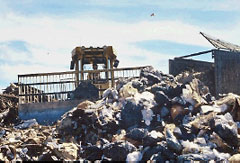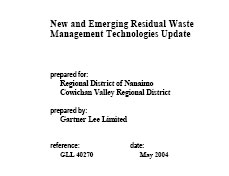New & Emerging Technologies
 Residual waste being disposed of at the Regional Landfill.
Residual waste being disposed of at the Regional Landfill.
 Please [ Click Here
] to download the New and Emerging Residual Waste Management Technologies report.
Please [ Click Here
] to download the New and Emerging Residual Waste Management Technologies report.
In 2004, the Regional District of Nanaimo (RDN) and the Cowichan Valley Regional District (CVRD) jointly conducted a review of new and emerging waste management technologies.
The main objective of this review was to determine the potential application of these technologies in dealing with waste that cannot otherwise be reduced, reused, recycled or composted.
Residual waste management technologies reviewed included Material Recovery Facilities, Refuse Derived Fuel, Steam Production, Fermentation (Ethanol Production) and Anaerobic Digestion.
The technologies reviewed varied considerably in terms of their advantages and disadvantages. Many technologies offer significant value in terms of the amount of waste diverted from landfill. Some have the added advantage of maximizing the recovery of marketable recyclables, whereas others have the added advantage of maximizing energy recovery and power generation potential.
The review indicates that there may be some promise for residual waste processing in the future. The feasibility will be based on available waste quantities, the change in composition, the technology involved and energy markets. It recommends that the RDN and CVRD
- Continue to monitor the development of the technologies that have proven to be technically viable;
- Keep abreast of municipal activities in Canada related to residual waste management projects and the associated costs and benefits; and
- Consider residual waste processing technologies in the context of the RDN and CVRD's whole waste management systems, as a given technology may or may not be beneficial to the current solid waste management planning direction. All of the implications of adopting a residual waste technology should be assessed before adoption.
